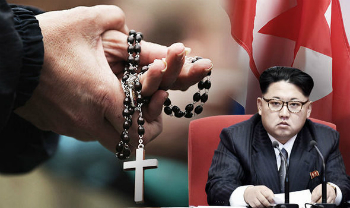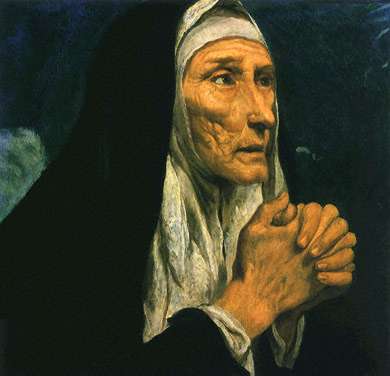What is prison like for Christians in North Korea?
FREE Catholic Classes
What is prison life for Christians in North Korea? The release of Otto Warmbier in a coma has many wondering just how harsh is prison life in North Korea? The nation runs a notorious collection of prison camps, and Christians often find themselves inside.

North Korea is the world's most dangerous place to be a Christian.
Highlights
Catholic Online (https://www.catholic.org)
6/14/2017 (8 years ago)
Published in Living Faith
Keywords: North Korea, prison, camp, Christian, persecution, life
LOS ANGELES, CA (California Network) -- North Korea is officially an atheistic regime, but the national religion is Juche, a philosophy that emphasizes self-reliance, national pride, and absolute devotion to the Supreme Leader.
Religion competes with this philosophy, and as such it is frowned upon. Religion is not explicitly outlawed, since religion is a powerful motivator which is difficult to outlaw, but it is persecuted. There are Christians in North Korea. Most have converted from atheism, evangelized by pastors who visit under the guise of business or humanitarian work. Bibles and other Christian literature are distributed in secret because they are forbidden.
Believers run the risk of being turned in by their own spouses, or children. Prayers are always said in secret. Often, the toilet is the only safe place to pray. Gatherings are limited to a few official state sanctioned churches, which are under constant surveillance. Citizens who participate in these officially sanctioned churches are labeled by the government. The churches are so tightly controlled, some speculate they may be operated only for show. It's a valid hypothesis, as the government often hires people to visit stores, subways and other locations to give foreigners a false sense that the people are prosperous, free and happy.
The nation, with a population of 24 million souls, has an estimated 300,000 Christians. Sometimes these secretive Christians are discovered and denounced. If convicted, they face a wide range of harsh penalties.
Christians are subject to hard labor, torture, and even execution. Often, their entire family is imprisoned, even if only one member of the household is Christian. Beatings, exhaustion, and illness are common.
Citizens are monitored at all times and at all levels. Not only are they expected to inform on one another, monitoring is also done through electronic means. The internet, if it can be accessed at all, is tightly restricted. If a person is reported as a Christian, or otherwise discovered, a severe process is set in motion.
Arrests are swift and violent. People are often apprehended from their homes by large numbers of raiding officials. Their residences and other locations they frequent are scoured for evidence. Careful notes are taken for anything that can be used to implicate the accused and others.
Once in custody, torture is common. Interrogations can last all day, every day, and carry on for weeks or even months, until victims break down and confess. Confessions are often written under torture or duress. Psychological torture is common as the accused are told all manner of terrible things to destroy their hope. They may be told they've been forgotten, condemned by family members, or that their family is being subjected to punishment. Since 1994, family arrests have declined, but may still happen.
Trial is often a swift affair as there is little to say or do in the way of self-defense. Most Christians do not renounce their faith anyway, and so virtually all are sentenced to labor camps.
North Korea's labor camps are important industrial centers for the nation. A wide range of products are made in these camps which can be the size of small cities and house tens of thousands of prisoners.
Food in the camps is minimal, so starvation is common. Forty percent die of malnutrition. Guards routinely beat and torture prisoners, and face no consequences if they should kill a prisoner. Guards can kill prisoners for any reason. Rape is also a common fate, with guards killing the victims afterward to prevent reporting.
Prisoners are compelled to perform hard labor for at least ten hours per day, seven days per week. Work is usually in the fields or in mining. Prison labor provides a considerable output of coal, which the nation exports. Prisoners may also be put to work in factories.
All prisoners must meet quotas for their work. Those who don't meet their quota are punished. A common punishment is to confine them to tiny cells where they can neither stand or lie.
Many Christians are sent to reeducation camps. Their sentences often provide a vague hope of release, although none are likely to survive. As part of their reeducation, they are required to memorize speeches, and criticize themselves at length.
Anyone who steals food, or attempts to escape, or breaks any of the camp rules is usually sentenced to death. The deaths can be immediate, or they can be postponed for show. Firing squads, hangings, or mauling by dogs are common fates.
Many others die from illness or workplace accidents. Most labor is done by hand, or with simple tools, making it both difficult and dangerous.
It is not known if prisoners are able to practice their faith within the camps. One can imagine small groups of prisoners gathering in the dark after a day of grueling labor. They whisper prayers to themselves. Perhaps someone has scratched a cross into a wall, or created a makeshift one out of twigs. Perhaps they merely close their eyes as they sleep on the floor, and silently meditate on a prayer, holding each word in their mind, savoring it as one does a delicacy.
In most forms of Christian belief, imprisonment and death for the faith are a form of martyrdom. It's presumed martyrs are assured salvation. What greater act of faith, love and devotion is there than to give one's life to God? None can be imagined.
All Christians are asked to pray for those incarcerated in North Korea, especially those whose only crime is to know and love God, and to keep His commandments.
---'Help Give every Student and Teacher FREE resources for a world-class Moral Catholic Education'
Copyright 2021 - Distributed by Catholic Online
Join the Movement
When you sign up below, you don't just join an email list - you're joining an entire movement for Free world class Catholic education.
-

- Easter / Lent
- Ascension Day
- 7 Morning Prayers
- Mysteries of the Rosary
- Litany of the Bl. Virgin Mary
- Popular Saints
- Popular Prayers
- Female Saints
- Saint Feast Days by Month
- Stations of the Cross
- St. Francis of Assisi
- St. Michael the Archangel
- The Apostles' Creed
- Unfailing Prayer to St. Anthony
- Pray the Rosary
Making a Difference: Why the silence on abortion?
10 Fascinating Facts About St. Carlo Acutis
Pope Leo XIV Announces 2026 World Day of Peace Theme: ‘Peace Be With You All”’
Daily Catholic
 Daily Readings for Wednesday, August 27, 2025
Daily Readings for Wednesday, August 27, 2025 St. Monica: Saint of the Day for Wednesday, August 27, 2025
St. Monica: Saint of the Day for Wednesday, August 27, 2025 Prayer for Choosing a State of Life: Prayer of the Day for Wednesday, August 27, 2025
Prayer for Choosing a State of Life: Prayer of the Day for Wednesday, August 27, 2025 Daily Readings for Tuesday, August 26, 2025
Daily Readings for Tuesday, August 26, 2025 St. Teresa of Jesus Jornet Ibars: Saint of the Day for Tuesday, August 26, 2025
St. Teresa of Jesus Jornet Ibars: Saint of the Day for Tuesday, August 26, 2025- A Prayer to Holy Guardian Angels: Prayer of the Day for Tuesday, August 26, 2025
![]()
Copyright 2025 Catholic Online. All materials contained on this site, whether written, audible or visual are the exclusive property of Catholic Online and are protected under U.S. and International copyright laws, © Copyright 2025 Catholic Online. Any unauthorized use, without prior written consent of Catholic Online is strictly forbidden and prohibited.
Catholic Online is a Project of Your Catholic Voice Foundation, a Not-for-Profit Corporation. Your Catholic Voice Foundation has been granted a recognition of tax exemption under Section 501(c)(3) of the Internal Revenue Code. Federal Tax Identification Number: 81-0596847. Your gift is tax-deductible as allowed by law.



 Daily Readings for Wednesday, August 27, 2025
Daily Readings for Wednesday, August 27, 2025 St. Monica: Saint of the Day for Wednesday, August 27, 2025
St. Monica: Saint of the Day for Wednesday, August 27, 2025 Prayer for Choosing a State of Life: Prayer of the Day for Wednesday, August 27, 2025
Prayer for Choosing a State of Life: Prayer of the Day for Wednesday, August 27, 2025 St. Teresa of Jesus Jornet Ibars: Saint of the Day for Tuesday, August 26, 2025
St. Teresa of Jesus Jornet Ibars: Saint of the Day for Tuesday, August 26, 2025


